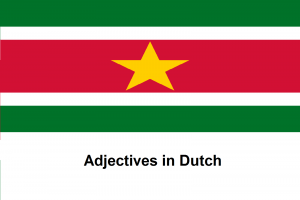Difference between revisions of "Language/Dutch/Grammar/Adjectives"
(Adjectives in Dutch) |
m (Quick edit) |
||
| Line 35: | Line 35: | ||
* Het '''gewassen''' kleed - ''The '''washed''' dress'' (This comes from the verb "wassen", which has an irregular past participle, although the present tense of the verb is regular. If a verb has an irregular past participle, it is the same as the past participle used as an adjective) | * Het '''gewassen''' kleed - ''The '''washed''' dress'' (This comes from the verb "wassen", which has an irregular past participle, although the present tense of the verb is regular. If a verb has an irregular past participle, it is the same as the past participle used as an adjective) | ||
|} | |} | ||
==Related Lessons== | |||
* [[Language/Dutch/Grammar/Genitive-Case-in-Dutch|Genitive Case in Dutch]] | |||
* [[Language/Dutch/Grammar/Ordinal-Numbers-in-Dutch|Ordinal Numbers in Dutch]] | |||
* [[Language/Dutch/Grammar/Prepositions|Prepositions]] | |||
* [[Language/Dutch/Grammar/How-to-use-“to-speak”-in-Dutch|How to use “to speak” in Dutch]] | |||
* [[Language/Dutch/Grammar/Interrogative-words-in-Dutch|Interrogative words in Dutch]] | |||
* [[Language/Dutch/Grammar/The-Locative-Case-in-Dutch|The Locative Case in Dutch]] | |||
* [[Language/Dutch/Grammar/Negation|Negation]] | |||
* [[Language/Dutch/Grammar/Plurals|Plurals]] | |||
* [[Language/Dutch/Grammar/Present-Continuous-in-Dutch|Present Continuous in Dutch]] | |||
* [[Language/Dutch/Grammar/The-Dative-Case-in-Dutch|The Dative Case in Dutch]] | |||
Revision as of 17:01, 26 February 2023
.
.
Hello everybody,
In today's lesson you will learn "ADJECTIVES" in Dutch.
Feel free to edit this page by adding new words and expressions !
Good learning! :)
.
Adjectives in Dutch (Dutch: Bijvoeglijke naamwoorden/Adjectieven) can be placed before the noun or after the noun, just like in English. When the adjective is placed after the noun (mostly using a verb like zijn (to be)), or when the adjective relates to another adjective, it is called an adverb (Dutch: Bijwoord).
The following examples are all adjectives and no adverbs!
Remark: When you're talking about superlatives, the following may occur: Jij bent de grootste jongen - You're the biggest boy (In the superlative, it's possible that the adjective has two consecutive vowels, which is not possible in the regular form) |
Past participle used as an adjective (Voltooid deelwoord gebruikt als een bijvoeglijk naamwoord/adjectief
It is possible to use a past participle as an adjective, just like in English. However, there are some rules you have to follow.
|
